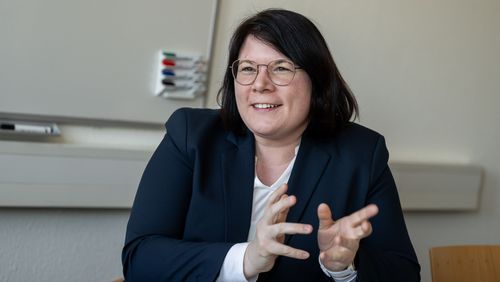Home office instead of lecture hall - due to the corona crisis, courses in the summer semester are taking place online. Here, Olaf Zawacki-Richter, expert for knowledge transfer and learning with new technologies, talks about what really matters in online education.
Professor Zawacki-Richter, digital teaching methods are currently experiencing an unexpected upswing...
That's right - at the moment you don't need to explain to anyone how important digital education is. Currently, we are all concerned with formats such as video-based lectures or discussion forums where students can exchange ideas with one another and with the teachers.
The University of Oldenburg is a traditional university where students and teachers meet on campus. How can digital methods be integrated into classical ways of teaching?
It's all about combining the best of both worlds: Face-to-face education allows for a direct dialogue between students and teachers; e-learning offers more flexibility and more individual learning. In my view, learning with video formats, so-called flipped learning, is particularly intriguing. Teachers can present virtual lectures online - not as a 90-minute teaching video, but in shorter units. Subsequently, they can ask further questions and assign students different tasks. At the University of Oldenburg, the social scientist Sebastian Schnettler delivers his statistics lecture in this way - and received the University’s Teaching Award last year.
What are the advantages of this method?
Students can watch the videos whenever they want and even several times if they don't understand something right away. Especially for introductory lectures, for example in the field of mathematics, I find the method very useful since the content hardly changes from semester to semester. Teachers may use the video content again and again.
Would students no longer need to attend classroom lectures at all?
On the contrary: lectures could provide a forum for discussing the content and clarifying questions. This would also be more stimulating for the lecturers than giving the same lecture every semester. However, in my view it doesn’t make sense to move entire seminars online as part of traditional study programmes. Younger students in particular often rely on the external structures and support offered in face-to-face classes.
Some programmes already offer mainly online courses, regardless of the current situation...
Yes, for example the part-time, blended learning courses taught at the Center for Lifelong Learning. These are mainly based on online modules. In some programmes students meet face-to-face only once. A second phase - where students are supposed to meet and work together - takes place entirely online. Here, among other tasks, students film themselves while giving a presentation. This is helpful because students can work from home and at the same time improve their digitals skills. These may be useful for future work settings: Many international companies rely more and more on digital collaboration tools.
Your research also focuses on comparing e-learning approaches on an international level. How well are universities in other countries prepared for the Corona crisis?
That depends on how deeply e-learning is already rooted in a higher education system. In Germany, the number of study programmes supported by distance learning is increasing and there are, for example, the courses offered by the Fernuniversität Hagen. But we are still lagging behind the pioneers of distance learning such as Great Britain, Australia and South Africa. In Australia, many universities offer their courses of study in two forms - as on-campus study and as online study. There it is much easier to transfer study content into an online format. Still, it remains a challenge because many teachers and students are not familiar with these methods and first have to reorient themselves.
How will the corona crisis influence digital teaching and learning in the long run?
Overall, I think that teaching will become more digital in the period after the corona crisis. This is because studies show that the desire for e-learning grows among teachers and learners once they have gained experience with it. I also hope that Open Educational Resources (OER), that is teaching materials that are published under an open licence, will now receive more attention. We are currently working on a research project to develop a quality assurance tool for OERs. For Lower Saxony, an online portal for open educational materials is currently being set up. Here, among other things, learning materials are to be made available for university teaching. We will be able use this material, edit and share it again for our teaching.
Interview: Iria Sorge-Röder




